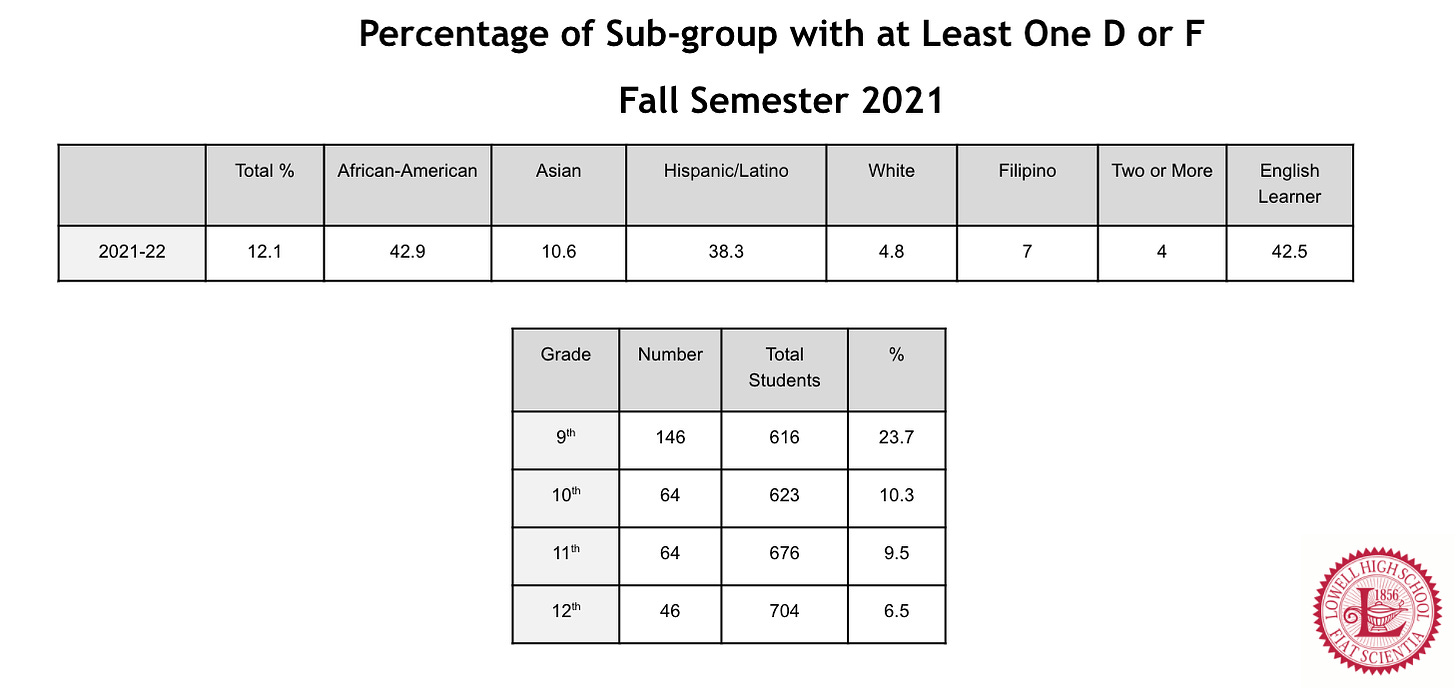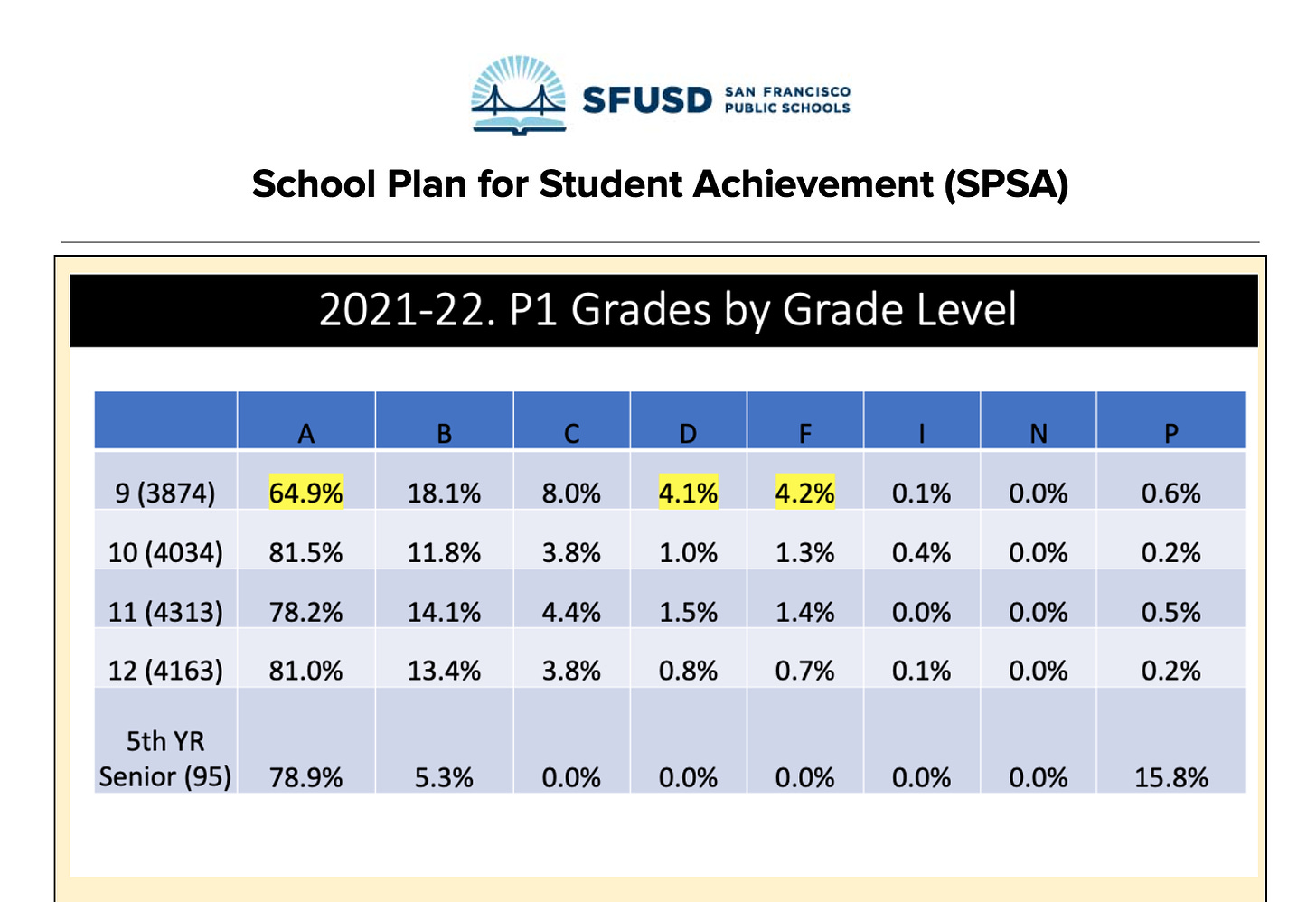As predicted by opponents of the lottery, academic achievement of newly admitted freshmen is not on par with that of previous classes. We can see this in new data from the 2022-2023 Site Planning slide deck:
Nearly a quarter of the freshman class have earned at least one D or F during Fall 2021. That’s more than twice the rate of any other grade, and nearly four times as high as the D/F rate for seniors. While the School Plan for Student Achievement (SPSA) implies COVID-19 is responsible for this discrepancy, grades 10-12 experienced the same pandemic and longer school closures.
Here we see that just 64.9% of grades earned by 9th graders are As, compared to about 80% for grades 10-12. While 4% of grades earned by 9th graders are Ds, and 4% are Fs, these numbers are closer to 1% each for grades 10-12.
Is it normal for almost 25% of Lowell freshmen to receive Ds and Fs? Or for freshmen to earn four times the number of D/F grades as 10-12 graders?
While our analysis would be more complete if we had access to prior years’ D/F data, there is evidence that the achievement gap between the lottery class and the other classes is out of the ordinary:
I’ve examined the latest SPSAs for all SFUSD high schools and not a single one (other than Lowell) lists freshmen as a “focal group” that requires special attention.
Lowell’s SPSA states “Over the past several years, Lowell High School has been very consistent with our students’ academic achievement overall, but has needed to continue the hard work of closing the achievement gap that exists for our students of color: African American, Latinx, and English Language Learners.” Notably absent from this retrospective is any mention of work with or concern about freshmen.
The site planning document indicates that every freshman will be enrolled in “College & Career / Study Skills” classes which focus on “stress relief, study strategies, skill building & digital citizenship.” In the past, these classes were only required for those students who were admitted based on factors other than academic merit.
The New Yorker recently published an article examining the outcomes of the Lowell lottery experiment. The article confirms that the freshmen are performing worse than usual: “At Lowell, the first round of grades had been filed for the freshmen, and teachers saw a big change from previous years.” One biology teacher reported having three times the usual number of failing students. The principal confirmed that the average freshman GPA was down 10%.
It isn’t only that the lottery freshmen are underperforming, it’s why. Some are not prepared — like the student who reads at a 3rd grade level. One teacher reported an unusual number of vocabulary questions — like the student who thought “landed gentry” meant “those guys that have no testicles.” Some don’t have grit, they “just give up.” Some aren’t self-driven, like the student who entered the lottery at the urging of his mom, despite not being a “stellar student.” Some simply don’t do the work: another teacher reported that some of his students did no work during the entire grading period. Even when offered extra resources, few took the opportunity to improve themselves.
One year is more than enough to see that the lottery is a failed experiment. Had we simply examined historical precedent (CUNY abandoned academic standards in the late 1960’s), we could have avoided making the same mistake. We were told the lottery would help a mythical creature: a student who is just as academically capable, just as motivated to work, just as eager to learn, but lacks the never-specified “resources” needed to demonstrate this via their grades and test scores. Why make policy to benefit a student who may or may not exist? The lottery is placing more students at Lowell whose educational needs cannot be met without slowing down the entire class or expending funds Lowell does not have.
True equity means meeting students where they are and placing them in the educational environment that helps them reach their full potential. Equity is not achieved by shuffling students into schools by skin color, then celebrating a meaningless demographic shift while unprepared students flounder and are forced to re-take classes. We can accurately predict educational outcomes at Lowell using objective, academic merit-based admissions. Students are not assigned Individualized Education Plans (and the associated extra funding) via lottery — they are tested to determine need. Similarly, students should be tested to establish their need for an accelerated learning environment like Lowell High.
The lottery is a performative “fix” that benefits nobody. Not the unprepared students who find Lowell “toxic” and are more likely to drop out. Not Lowell High, which will be required to spend its meager budget* on remedial support. Not the school district, which will lose students who can afford private school. Worst of all, the lottery hurts students with proven track records of academic success who can’t afford private school. Whose dystopian vision of equity is this?
*After AP funding cuts, Lowell High will receive the lowest per pupil funding of any SFUSD high school
Update: I wrote an update to include new data from SFUSD.




Is the first semester back enough time to analyze the data? Post virtual school?
Grading is a highly subjective metric and without concomitant SBAC scores to verify actual proficiency we are shooting blind. Saying a quarter of the freshman class has earned at least one D or F only tells us the best possible academic proficiency scenario in what is a purposefully murky metric designed to hide real outcomes. Using historical SBAC and STAR data for ethnic subgroups provides a much more realistic idea at what is likely happening with Lowell proficiency given the skewed metric that “at least one D or F” provides. I won’t go into the embarrassing scores themselves, but suffice is to say they point to much more than one D or F. Add onto that the heavy-handed administrative push on teachers not to assign Ds and Fs and the perpetuation of the false notion that doing so is only a reflection of the teacher not the student, collectively we have a significantly worse scenario at Lowell then is currently reflected in the melange of soft indicators that passes for data at SFUSD.